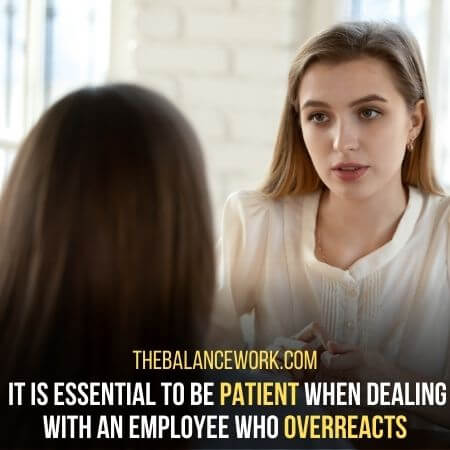A dramatic employee might be funny at first but can be frustrating too. Let’s discuss how to handle an employee who overreacts to little things.
Overreaction in the workplace is not uncommon. It can happen to even the best of us.
7 Steps To Handle An Employee Who Overreacts
However, when an employee overreacts regularly, it can become a problem for both the individual and the company.
So let’s discuss how to handle an employee who overreacts.
1. Talk To The Employee Privately:
If you have an overreacting employee, the first step is to talk to them privately.
This will allow you to get to the root of the problem and find out what is causing the overreaction.

Moreover, it will also allow the employee to explain their side of the story.
You can start the conversation with something like:
“I noticed that you seem to be overreacting to certain things. Can we talk about what’s going on?”
Then, listen to what the employee has to say. You might find that there is a good reason for their overreaction.
2. Try To Understand The Reasons Behind The Overreaction:
Once you have talked to the employee, try to understand the reasons behind the overreaction.
Is the overreaction due to a personal issue? Or is it work-related?
If it is work-related, what is causing the stress?
What is it that sets off the overreaction? Is it a specific type of situation? Or is it a particular person?
By understanding the reasons, you will be better positioned to solve the problem.
For instance, you may find that the overreaction is due to being overwhelmed by the workload.
3. Help The Employee Find A Solution:
Once you have identified the reasons behind the overreaction, try to help the employee find a solution.
For instance:
If the overreaction is due to a personal issue, you could offer the employee some time off.
If an employee is overwhelmed by their workload, you can reduce their workload. Also, you can offer them some help with their work.
Or, the overreaction may be due to a conflict with another employee. You can try to mediate the situation.
Or the trigger might be deadlines. See if there is a way to give the employee more time to complete the task.
The trigger may be a demanding customer. See if there is a way to transfer the call to another team member.
4. Help The Employee To Relax:
If the overreaction is due to stress, help the employee to relax.
There are many ways to do this, such as taking a break, doing some relaxation exercises, or listening to music.
You can also encourage the employee to take some time off if possible.
It will also help create a positive and relaxed environment in the workplace.
5. Follow Up:
Once you have implemented the solutions, follow up with the employee. See if the overreaction has stopped.
If not, then try to find out what is causing the overreaction. And try to find a different solution.
Remember, it is essential to be patient when dealing with an employee who overreacts.
It might take some time for the solutions to work.

Moreover, the employee might need some time to adjust to the changes.
So, be patient and keep following up with the employee. It is also essential to be supportive of the employee.
Let them know that you are there for them. Also, you will help them through this difficult time.
6. Set Some Ground Rules:
If you have tried all of the above and the overreaction continues, you may need to set some ground rules.
For instance:
Tell the employee that they need to take a break. If they feel like they are about to overreact.
Or, you could tell them that they need to come to you first before taking any action.
Setting some ground rules will help to prevent the overreaction from happening.
7. Seek Help From A Professional:
If the overreaction is severe and nothing seems to be working, you may need to seek help from a professional.
A professional will be able to assess the situation and provide further help.
They can also offer guidance on how to deal with the overreaction.
Overreacting can be a sign of a bigger problem. So, it is crucial to get help from a professional if nothing else is working.
So here are some tips on dealing with an employee who overreacts.
Some Overreactions And A Guide To Solve Them (Explained)
Let’s break down some overreactions and how you can solve them:
1. Yelling:
If an employee starts to yell, it can be very off-putting for other employees. It can also create a tense and hostile environment.
To solve this problem, you could:
– Try to calm the employee down by speaking in a calm and collected voice.
– Ask the employee to take a break.
– If the yelling continues, you could ask the employee to leave the premises.
This type of behavior is probably due to stress. So, it is important to try to help the employee to relax.
2. Throwing Things:
If an employee starts to throw things, it is a sign that they are becoming furious. This can be dangerous as they could end up hurting someone.
To solve this problem, you could:
– Try to calm the employee down by talking
– Ask the employee to put the items down.
– If the employee continues to throw things, order them to leave.
3. Becoming Physical:
Becoming physical is a sign that the employee has lost control. You can try to diffuse the situation by:
– Try to calm the employee down.
– If the employee continues to become physical, call security.

Becoming physical can be very dangerous. It would help if you took immediate action.
4. Refusing To Work:
When an employee refuses to work, it can be very disruptive to the workplace. To solve this problem, you could:
– Talk to the employee to find out the reason for their refusal.
– Help the employee to solve the problem.
– If the employee continues to refuse to work, you could use disciplinary action.
5. Storming Out:
If an employee storms out, it can have a negative effect on the workplace. Try to resolve this behavior by:
– Trying to talk to the employee to find out why they are upset.
– Help the employee to solve the issue.
Storming out is often a sign that the employee is unhappy with something.
Now you know some of the overreactions that employees might have. Let’s move on to the issue which can cause them:
Some Triggers And How To Solve Them (Explained)
Let’s get to the root causes of the overreactions:
1. Stress:
One of the leading causes of overreactions is stress. Stress can be due to different things such as:
– Having too much work to do.
– Not having enough time to do the work.
– Having a deadline that is too tight.
– Having a complex project.
There are many ways to reduce stress. Some of them are to:
– Take breaks during the day.
– Exercise regularly.
– Eat healthy food.
– Get enough sleep.
– Meditate or do relaxation exercises.
If an employee is under stress, try to help them to reduce their stress levels.
2. Lack Of Sleep:
Another trigger for overreactions is lack of sleep. When we don’t get enough sleep, we are more likely to become irritable and overreact.
To solve this problem, you could:
– Try to help the employee to get more sleep.
– Encourage the employee to take breaks during the day.
– Suggest that the employee exercises regularly.
3. Personal Problems:
Personal problems can also trigger overreactions. Some emotional problems are:
– Family problems.

– Relationship problems.
– Financial problems.
– Health problems.
If an employee is having personal problems, you could:
– Talk to the employee to find out the problem.
– Do everything you can to resolve the problem.
Personal problems can be very complicated to deal with. It is essential to try to help the employee to solve the problem.
4. Drugs Or Alcohol:
Another trigger for overreactions is drugs or alcohol. When we take drugs or alcohol, we are more likely to become aggressive and overreact.
To solve this problem, you could:
– Encourage the employee to get help for their drug or alcohol problem.
– Take rehabilitation leave.
– Disciplinary action.
5. Mental Health Problems:
Mental health problems can also trigger overreactions. Some mental health problems are:
– Depression.
– Anxiety.
– Disorders such as ADHD or OCD.
If an employee is suffering from a mental health problem, you could:
– Get them to see a mental health professional.
– Take sick leave.
– Disciplinary action.
Mental health is being focused on today more than ever. Thus, it is crucial to understand if an employee overreacts due to a mental health issue.
6. Conflict With Co-Workers:
Conflict with co-workers can also trigger overreactions. It is often caused by:
– Miscommunication.

– Different opinions.
– Personality differences.
– Help the employees talk to each other and resolve the issue.
– Encourage the employees to work together.
– Take disciplinary action.
Conflict is a normal part of life. However, it is essential to resolve the conflict as soon as possible.
7. Poor Work Environment:
A poor work environment is often caused by:
– Poor management.
– Bad working conditions.
– Low pay.
Although you cannot always control the work environment, you can try to improve it. You could:
– Talk to the employees about the problems they are having.
– Find ways to improve the working conditions.
– Pay the employees more money.
A poor work environment is often the cause of overreactions. If you can improve the work environment, you will reduce the number of overreactions.
Conclusion:
There are many triggers for overreactions. However, there are also many ways to solve the problem.
The most important thing is to find the root cause of the overreaction and resolve it.
Start with the most apparent triggers and work your way down the list. You will likely find that you can resolve most overreactions with little effort.
Last Updated on 2 hours by Shahzaib Arshad
- Why Does My Boss Wink At Me? 6 Potential Reasons - October 5, 2023
- Is It Legal For Your Employer To Call Your Doctor? No, But… - October 4, 2023
- 12 Ways To Deal With A Low IQ Person - September 22, 2023